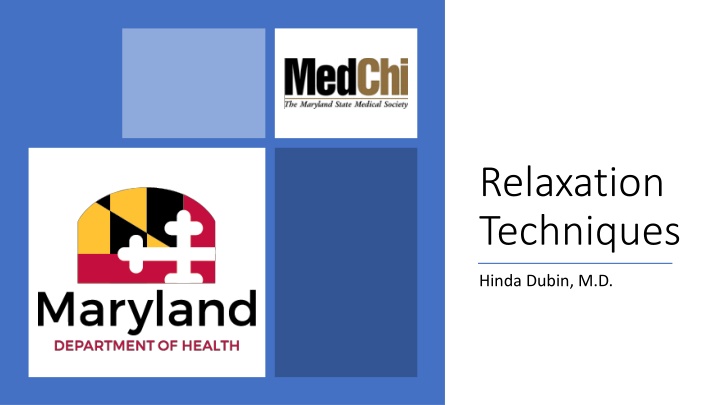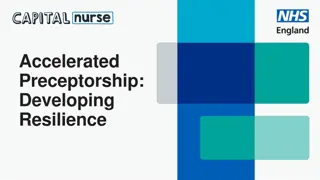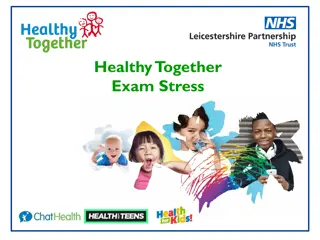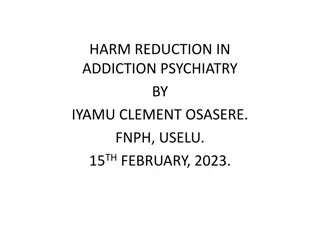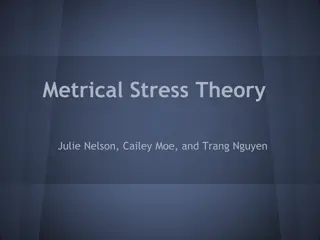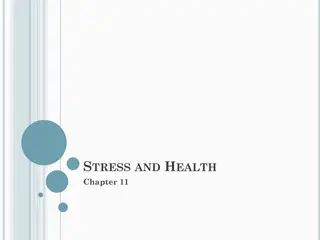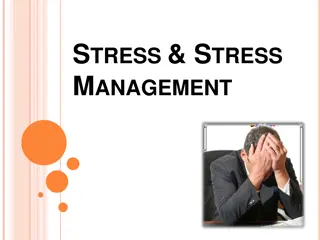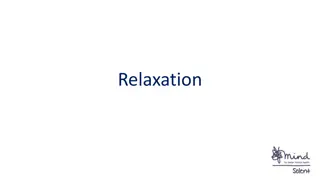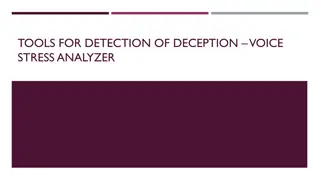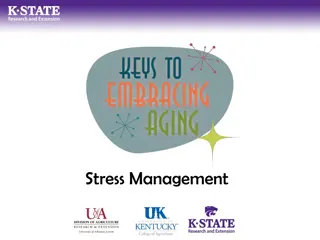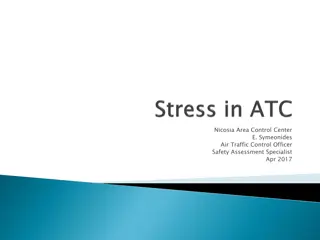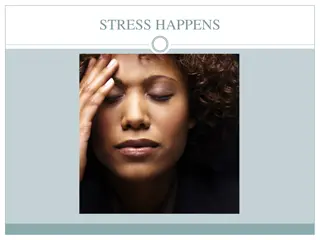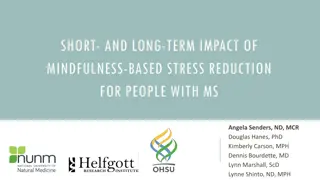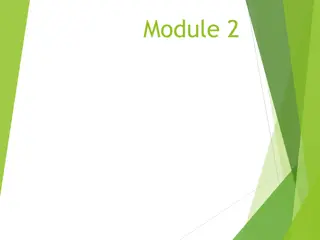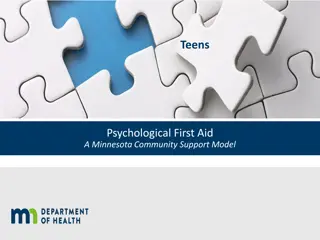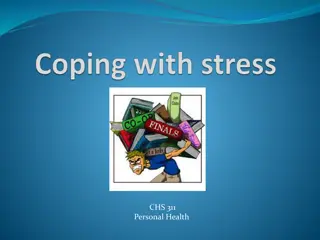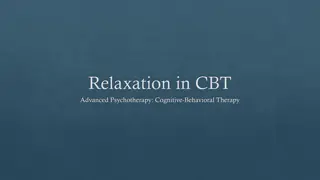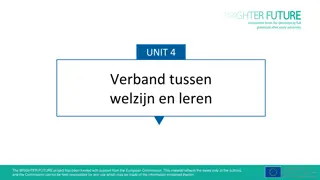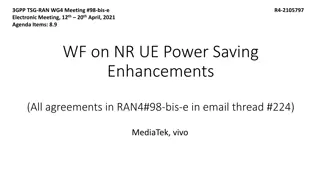Evidence-Based Relaxation Techniques for Stress Reduction and Well-Being
Explore evidence-based relaxation techniques such as progressive muscle relaxation, cognitive behavior therapy, guided imagery, and more for stress reduction and improved quality of life. Discover the long-term benefits of these techniques in managing stress levels, reducing anxiety, and improving physiological responses. Dive into cognitive models that highlight the influence of automatic thoughts on emotions and behaviors, along with practical tools like the Dysfunctional Thought Record for addressing negative thought patterns.
Download Presentation

Please find below an Image/Link to download the presentation.
The content on the website is provided AS IS for your information and personal use only. It may not be sold, licensed, or shared on other websites without obtaining consent from the author.If you encounter any issues during the download, it is possible that the publisher has removed the file from their server.
You are allowed to download the files provided on this website for personal or commercial use, subject to the condition that they are used lawfully. All files are the property of their respective owners.
The content on the website is provided AS IS for your information and personal use only. It may not be sold, licensed, or shared on other websites without obtaining consent from the author.
E N D
Presentation Transcript
Relaxation Techniques Hinda Dubin, M.D.
Progressive Muscle Relaxation Cognitive Behavior Therapy Guided imagery Relaxation response Guided Imagery Diaphragmatic Breathing Transcendental Meditation Autogenic training Evidence-based Relaxation Techniques Reference 1
Mindfulness based stress reduction Emotional freedom technique Reference 1
Stress Evidence based stress reduction techniques can lower stress levels, reduce disease symptoms, improve quality of life
Progressive Muscle Relaxation long term benefits include: Evidence Based Stress Management Techniques Reduction of salivary cortisol levels and generalized anxiety Decreased blood pressure and heart rate Decreased headaches Reference 1
Cognitive Model Situation--->Automatic Thought--- > Feeling, Behavior, Physiological Response Cognitive Behavior Therapy Reference 2
Automatic thoughts influence emotions, behaviors and physiology
Dysfunctional Thought Record Directions: When you notice your mood getting worse, ask yourself, What s going through my mind right now? and as soon as possible jot down the thought or mental image in the Automatic Thought column. Date/ Time Situation Automatic Thought(s) Emotion(s) Alternative Outcome Response What actual event or stream of thoughts, or daydreams, or recollection led to the unpleasant emotion? What (if any) distressing physical sensations did you have? What emotion(s) (sad, anxious, angry, etc.) did you feel at the time? How intense (0 100% was the emotion? How much do you now believe each automatic thought? What emotion(s) do you feel now? How intense (0 100%) is the emotion? What will you do? (or did you do?) 1. 1. 1. What thought(s) and/or images(s) went through your mind? How intense (0 100% was the emotion? (optional) What cognitive distortion did you make? Use questions at bottom to compose a response to the automatic thought(s). How much do you believe each response? 1. 1. 2. 2. 2. 2. 2. 3. 3. Questions to help compose an alternative response: (1) What is the evidence that the automatic thought is true? Not true? (2) Is there an alternative explanation? (3) What s the worst that could happen? Could I live through it? What s the best that could happen? What s the most realistic outcome? (4) What s the effect of my believing the automatic thought? What could be the effect of changing my thinking? (5) What should I do about it? (6) If _____ (Friend s name) was in the situation and had this thought, what would I tell him/her? (7) What s a more adaptive way to view this situation?
Well established in many traditions Helpful for stress reduction, smoking cessation, pre medical or surgical procedure, pain management Guided Imagery Reference 1
CME Accreditation and Designation Presenters and Planners: Hinda Dubin, MD, Amanda Robinson, MSHP, CHES, Shmuel Fischler, LCSW-C, have reported no relevant financial relationships to disclose. Aliya Jones, MD and Steve Whitefield, MD have reported no relevant financial relationships to disclose. MedChi CME Reviewers: The reviewers from the MedChi Committee On Scientific Activities (COSA) for this activity have reported no relevant financial relationships to disclose Webinars jointly sponsored by the BHA and MedChi
Guided imagery relaxation video https://youtu.be/sYRddKHMhOM
References 1. Stress Management Techniques: Evidence based procedures that Reduce Stress and Promote Health, Varvogli, L. And Darviri, C., Health Science Journal, Vol 5, Issue 2, 2011 2. Cognitive Behavior Therapy: Basics and Beyond, Judith S. Beck, The Guilford Press, 2011
CME Accreditation and Designation CMEs will be available at no cost, as will Participant Certificates, which for other disciplines can qualify for continuing education credit. This activity has been planned and implemented in accordance with the Essential Areas and policies of the Accreditation Council for Continuing Medical Education (ACCME) through the joint providership of MedChi, The Maryland State Medical Society and the Behavioral Health Administration of the Maryland Department of Health. MedChi is accredited by the ACCME to provide continuing medical education for physicians. CMEs will be available at no cost, as will Participant Certificates, which for other disciplines can qualify for continuing education credit. MedChi designates this webinar educational activity for a maximum of 1 AMA PRA Category 1 Credits . Physicians should claim only the credit commensurate with the extent of their participation in the activity, as should other disciplines who claim credit for Participant Certificates. For CME/Participant Certificate questions please contact Frank Berry at fberry@medchi.org Webinars jointly sponsored by the BHA and MedChi
